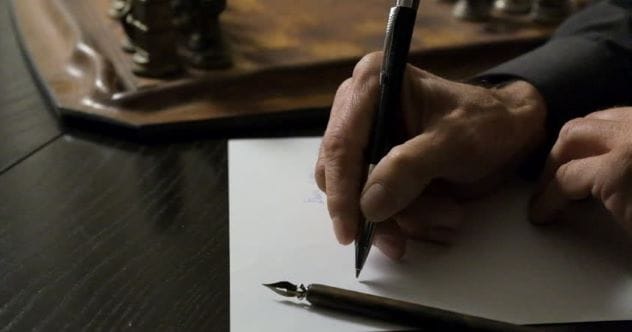The men on this list are known for their cruelty as dictators. They ordered, and sometimes personally carried out, the torture and killing of thousands, even millions. Their names are synonymous with infamy. It seems impossible that such villainous figures would have any interest in reading, let alone writing, novels or poetry. Yet, each of the 10 dictators on this list put pen to paper.
While some have received acclaim for their literary quality, others’ writings have been dismissed as unsuccessful. One novel was even closely examined by U.S. government translators, officials, and the CIA. Regardless of their literary merit, their grim rule as dictators will forever eclipse their literary endeavors.
Julius Caesar
Julius Caesar (100 BC–44 BC) is often seen as a Roman emperor, though he claimed the title of dictator a year before his assassination. A politically astute man, Caesar used his military triumphs and political alliances to climb the ladder, serving as governor of Spain and later Gaul. As governor of Gaul, he accumulated wealth, which he used to support his army when he crossed the Rubicon, instigating a civil war with Pompey, which he won. After his triumph, Caesar declared himself dictator of Rome.
Caesar was also a man of letters, whose oratory skills were praised by Quintilian. His The Conquest of Gaul demonstrates an elegance of language rivaling Cicero. Caesar’s Commentaries on the Gallic War and the Civil War, while non-fiction, are written with such clarity and elegance that they compel admiration.
Gifted in both public speaking and writing, Caesar also wrote poetry, including The Journey, allegedly written while traveling to Spain. Only a few lines survive, expressing his disappointment in the playwright Terence’s lack of comic force but praising his pure speech.
Giuseppe Garibaldi
Giuseppe Garibaldi (1807-1882), an Italian soldier of fortune and dictator of Sicily, sought to unify Italy. In May 1860, he landed in Sicily with 1,000 revolutionaries, the Redshirts, initiating the unification.
After intense fighting, culminating in victory at the Battle of Volturno River, King Victor Emmanuel II of Sardinia ordered Garibaldi to stand down. Garibaldi obeyed, relinquishing his dictatorial powers and returning to Caprera, slighted by the king who arrived only to end the war Garibaldi had fought for months.
Garibaldi wrote several novels, including Clelia, Il Volontario, and I Mille, hoping to support his family through their sales. However, these books were literary and historical failures. Garibaldi himself admitted their worthlessness.
Lucy Riall, author of Garibaldi: Invention of a Hero, notes that Garibaldi’s novels were not successful, with only Clelia being widely translated. He struggled to find a publisher for I Mille; his fourth novel, Manlio, was published posthumously in 1982.
Ludwik Mieroslawski
Ludwik Mieroslawski (1814–1878) was described as a Polish general, revolutionary activist, commander, and political writer. After participating in the November Uprising, he moved to France, where his attempt to organize a Young France failed. He then published poems, historical dramas, and a novel, all unsuccessful.
Returning to Poland, he supported a revolution but was arrested. After being released, he became a dictator during the 1863 January Uprising. He later left Europe, re-establishing the Polish Democratic Society, only to be removed from office due to his dictatorial ways and scandals. He died in poverty and isolation.
George J. Lerski’s Historical Dictionary of Poland, 966-1945, offers a more favorable view of Mieroslawski’s literary work. His 1822 collection of poems, Ballads and Romances, marked the beginning of Romanticism in Poland. Mieroslawski’s interests included themes and genres such as “Forefathers’ Eve,” Books of the Polish Nation and of the Polish Pilgrims, and Master Thaddeus, a sentimental novel in verse.
Emperor Meiji
Emperor Meiji (1852–1912) became the Emperor of Japan at sixteen. Through political skill, he ushered in a prosperous era for Japan. A child prodigy in poetry, he wrote his first verse at eight. He penned between 90,000 and 100,000 waka poems, which alternate lines of five and seven morae and conclude with a final line of seven morae known as the poem’s tanka.
The topics of Emperor Meiji’s poems often celebrate nature. His poem “Pine” reads, “In a world of storms/ Let there be no wavering/ Of our human hearts;/ Remain as the pine tree/ With root sunk deep in ston[e].” His poem “Universal Brotherhood” ends with the question, “It is our hope/ That all the world’s oceans/ Be joined in peace,/ So why do the winds and waves/ Now rise up in angry rage?”
Joseph Stalin
Joseph Stalin (1878–1953) is not usually associated with poetry. However, the Russian dictator wrote poetry as a student at the Spiritual Seminary in Tiflis, Georgia. He even aspired to become a professional poet. But, as Robert Service recounts in Stalin: A Biography, he lost interest in poetry after becoming alienated from the authorities, preferring to study socialism, politics, and economics. His participation in the Tbilisi literary scene was fleeting.
His interest in poetry is surprising, given his treatment of a celebrated Russian poet. Osip Emilievich Mandelstam wrote a derogatory poem about Stalin in 1933. The poem spread by word of mouth. It made it clear how the poet felt about the dictator with lines such as Stalin, “the Kremlin’s mountaineer,” hammered out laws that were “flung/ Like horseshoes at the head, the eye, or the groin.”
Stalin had Mandelstam arrested and exiled for three years. Although Mandelstam later wrote an ode praising Stalin, he was arrested again after his exile and sentenced to a Gulag, where he died soon after.
Benito Mussolini
Benito Mussolini (1883–1945), the Italian dictator and ally of Adolph Hitler, is remembered as Italy’s feared fascist leader during World War II. After his execution, his body was hung upside down, spat upon, and shot. The New York Times called his death “a fitting end to a wretched life.”
Surprisingly, Mussolini wrote a novel, Claudia Particella, l’amante del Cardinale (The Cardinal’s Mistress), in 1910. The book was considered scandalous. Mussolini 1883–1915: Triumph and Transformation of a Revolutionary Socialist, edited by Spencer M. Di Scalia and Emilito Gentile, observes that the dictator’s novel was, by his own admission, a nasty book. Serialized before publication, the novel tells a story of violence and shameful acts. Described as written in the style of Alexander Dumas, it was a success, translated into at least ten languages.
Although Mussolini served as Italy’s prime minister from 1922–1943 and would not become El Duce until 1943, perhaps he had not yet fully developed into the monster he would become as his nation’s dictator when he wrote his novel and retained a modicum of humanity to write a tawdry novel that would beguile people by delivering scandal.
Francisco Franco
Jaime de Andrade’s 1942 novel, Raz (Spirit of a Race), glorified the principles of the Franco regime. Jaime de Andrade was the pen name of Spanish dictator Francisco Franco (1892–1975), the true author of Raz.
Paul Preston points out in The Spanish Holocaust: Inquisition and Extermination in Twentieth-Century Spain, General Franco and his regime enjoyed a relatively good press. In reality, Franco was a cruel leader who described Moroccan villages destroyed and defenders decapitated in his war diary of 1922. Extreme violence was used to suppress free thought, speech, and resistance before, during, and after the Spanish Civil War (1936–1939).
According to Preston, Franco’s tactics included carrying bloody heads as trophies, fixing decapitated heads to bayonets, implementing mass murder, using kangaroo courts; and conducting cleansing operations. Franco’s terror resulted in between 130,199 and 150,000 fatalities. This truth was never mentioned in the dictator’s novel.
Mao Zedong
Mao Zedong (1883–1976), the Chinese dictator, wrote poetry filled with images from the natural world, autobiographical elements, and military events. “Yellow Crane Tower” (1927) exemplifies Zedong’s poetic technique. Jeremy Ingalls’s Dragon in Ambush: The Art of War in the Poems of Mao Zedong says Zedong’s poem employs “wordplay associated with the theme of imperial rule.”
The poem reads, “Through far and wide the nine streams branch across the Middle Kingdom,/ Far deeper now one track that runs from south to north is threading./ But under gray-green murk of rain-damp grime,/ Tortoise and Snake still trap the major stream./ The Yellow Crane perhaps still knows the route?/ Here still survives a traveler’s resting site./ The wine I seize to pledge the torrent’s roaring,/ In my heart’s tide that mounts, its own waves soaring.”
Dragon in Ambush’s interpretation of Zedong’s poem suggests the nine streams created by the emperor Yu are contrasted with Zedong’s intention to cut an even deeper track north as he and his army travel toward the Yangtze River to gain control of China.
The question posed about the Yellow Crane expresses Zedong’s confidence that he will cross the river, conquer China, and achieve immortality as a godlike figure, thanks to the crane.
Mohammad Raza Pahlavi
Mohammad Raza Pahlavi (1919-1980) was the Shah of Iran from 1941 to 1979. Abbas Milani points out in The Shah, his biography of Pahlavi, that Ernest Perron introduced the future leader to poetry. Author Jon Ingvar Kjaran states that the young shah wrote his own verses while visiting with Perron.
Despite Pahlavi’s early fondness for poetry, he became a dictator who ran a brutally repressive regime, enforced by the Savak secret police. His brutality and corruption led to conflict with Prime Minister Mohammad Mosaddeq. He was forced to flee the country, living in Mexico, the United States, Panama, and Egypt, where he died in July 1980.
Saddam Hussein
Saddam Hussein (1937–2006), the president of Iraq, was a brutal dictator. His cruelty is evident in mass graves throughout Iraq. Iraqi citizens testified to the atrocities inflicted on their relatives, including beatings, torture, executions, rape, and medical experiments.
This same dictator wrote both poetry and four novels, including Zabibah and the King, an allegorical love story. The CIA concluded that Hussein supervised the novel’s production and suffused it with his own words and ideas. Hussein’s style, sentence structure, and expressions are present in the novel. Elaine Sciolino of The New York Times noted that officials found “an intriguing window into Mr. Hussein’s thinking” amid the volume’s “rambling, overheated prose.”
Set in the ancient world, the narrative is a love story between a king, a stand-in for Hussein, and Zabibah, who represents the people of Iraq. The king shares his views on “God, politics, love, family, loyalty, betrayal and the will of the people” and his own “insecurities.”
The romance also includes a scene in which Zabibah is raped, seen as a reference to the United States invasion of Iraq or Israel’s treatment of Palestinians. The novel ends with the deaths of Zabibah and the king on January 17th, the day the United States-led coalition began bombing Baghdad. Their bodies are buried side by side “so that the people can throw stones on his grave to desecrate it on the anniversary of his death.”
In addition to Zabibah and the King, Hussein wrote The Fortified Castle (2001), Men and the City (2002), and Bygone Demons (2006).
These dictators, infamous for their cruelty and oppression, also engaged in literary pursuits, revealing a surprising dimension to their complex and often contradictory characters. From poetry to novels, their works offer a glimpse into their minds.
Share your thoughts on these literary dictators in the comments below.










